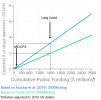
See thread here:
or here:
https://threadreaderapp.com/thread/1963603471979937805.html
(Wasn't sure where best to post this)
P.S. This comes with massive uncertainty intervals. Claude estimates:
Azoulay 95% CI: $217M to $3000M+ per drug (14x range, upper bound essentially unbounded)
Toole 95% CI: $467M to $1441M per drug (3x range)
Last edited:
